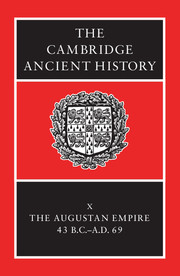14b - Egypt
from 14 - The East
Published online by Cambridge University Press: 28 March 2008
Summary
THE ROMAN CONQUEST
‘Aegyptum imperio populi Romani adieci.’ Augustus' stark factual statement, published almost half a century after the event it records, spotlights the final act of the drama of Rome's absorption of the hellenistic kingdoms. In August of 30 B.C., some ten months after the Battle of Actium, Octavian had pursued Cleopatra and Mark Antony to Egypt; both had perished by their own hand in the city founded by Alexander the Great. The conqueror perhaps flirted with the notion of formally inaugurating his ‘dominion’ (kratesis) from the date of the capture of Alexandria but he finally settled on the first day of the new Egyptian year (1 Thoth = 29 August), bridging the gap with a nominal eighteen-day ‘reign’ of the children of Antony and Cleopatra. Octavian was in Egypt for the first and last time. He saw and touched the corpse of Alexander the Great, causing a piece of the nose to fall off; but he scorned to view the remains of the Ptolemies, remarking that he wished to see a king, not corpses, and he affected insensitivity to local religious susceptibilities by his attitude to the venerated Apis bull, observing that he was accustomed to worship gods, not cattle. Egypt was now under the sway of a non-resident monarch; as a Roman province the country was effectively depoliticized and a good proportion of its resources was henceforth oriented towards the consuming nucleus of the empire, Rome itself.
Keywords
- Type
- Chapter
- Information
- The Cambridge Ancient History , pp. 676 - 702Publisher: Cambridge University PressPrint publication year: 1996
References
- 12
- Cited by

